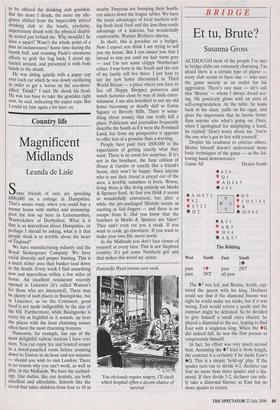BRIDGE
Et tu, Brute?
Susanna Gross
ALTHOUGH most of the people I've met in bridge clubs are extremely charming, I'm afraid there is a certain type of player every club seems to have one — who uses the game merely as an outlet for his aggression. There's one man — let's call him 'Brutus' — whom I always dread see- ing. He positively glows with an aura of self-congratulation. At the table, he leans back in his chair, puffs on his cigar, and gives the impression that he knows better than anyone else what's going on. Once, when I apologised for misplaying a hand, he replied: 'Don't worry about me. You're the one who's got to live with yourself.'
Despite his readiness to criticise others, Brutus himself doesn't understand many basic techniques of the game — as the fol- lowing hand demonstrates: Game All Dealer South 4 6 5 4 Q 5
♦ A Q J 6 5 # J 4 3
4 A 10 8 7 2 IP 9 2
♦ 8 7 3 2 • Q 2
4 Q 9
• J 10 8 7 6 4 ♦ K + 10 9 6 5
N W E S
4 K J 3 IP A K 3
♦ 10 9 4 • A K 8 7 The Bidding West North pass 1♦ pass 3NT East South 1+ pass 2NT all pass The 47 was led, and Brutus, South, cap- tured the queen with his king. Declarer could see that if the diamond finesse was right he could make ten tricks, but if it was wrong, East would return a spade and the contract might be defeated. So he decided to give himself a small extra chance: he played a diamond to the ace, hoping to find East with a singleton king. When the ♦K did indeed fall, he was the first person to congratulate himself.
In fact, his effort was very much second best. Assuming the 47 lead is from length, the contract is a certainty if he ducks East's 40. This is a simple 'hold-up' play. If the spades turn out to divide 4-3, declarer can lose no more than three spades and a dia- mond. If they divide 5-2, declarer can safe- ly take a diamond finesse, as East has no more spades to return.


























































 Previous page
Previous page